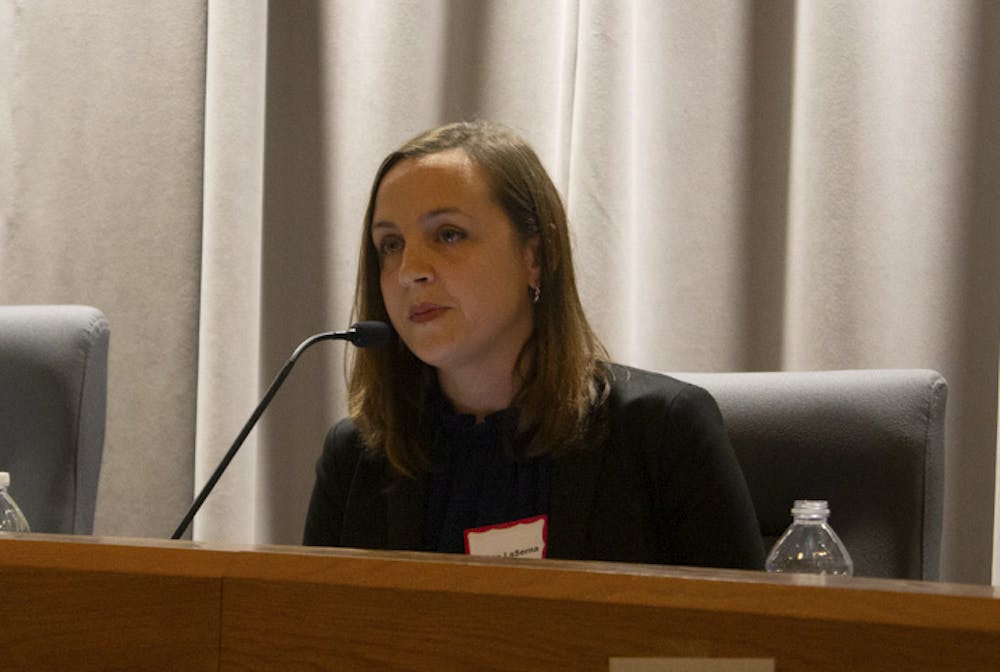“Those are the first steps to make sure that the decision-making process actually includes the families that we’re trying to reach,” he said.
Incumbent board member Rani Dasi and vice chairperson of the Equity Advisory Council Deon Temne said mitigating systemic racism and racial biases requires the school board to make structural changes.
Dasi said students of color need to see themselves represented in school curricula. She proposed recruiting more teachers of color.
“We need to create a welcoming climate,” she said. “When I walk into a school building, I should be treated the same as a white parent or maybe even better in some ways, given the history of America.”
Beyond creating cultural curricula, Temne said he thinks CHCCS needs to implement curricula that’ll make children “globally ready.”
Candidate Andrew Davidson, who was a school board member from 2013-17, introduced reshaping schools’ disciplinary policies as a way to promote equity among students.
“Ending suspensions for all infractions except for bringing a gun to school is my policy proposal for addressing the achievement gap,” he said.
Despite funding challenges, all five candidates promoted universal pre-K as another way to reduce the achievement gap to prevent some students from entering kindergarten two years behind.
“We used to have an assistant superintendent who said, ‘The best way to close the achievement gap is to never let it open,’” Dasi said.
2) Parents want the school board to better address their children’s mental health concerns.
Temne and Powell said they think parents and teachers need to listen to students.
Powell said he believes parents have been pressuring kids to succeed, which has kept them from finding joy in learning. That should stop, he said.
To get the day's news and headlines in your inbox each morning, sign up for our email newsletters.
“We need to make sure that we are showing the kids why they’re going to the classes they like," he said, "not just because they have better quality points and GPA potential, and so they’re not just stomping over each other trying to compete in order to get into a school.”
Dasi said the school board works with community partners, such as Orange County, to assess student mental health needs.
“Today, I think our kids are under a lot of stress,” Dasi said, “and it exists across the community.”
But Davidson, chairperson of the Special Needs Advisory Council, said the district’s biggest problem is a lack of resources.
“At the high school level, there’s a single autism specialist for three high schools, so the only thing that specialist can do is put out fires,” he said.
La Serna said schools could consider expanding their counseling programs and providing access to more training for school psychologists.
“Every student has different things that they may have going on,” she said. “A student may need support for mental health temporarily, ongoing, for a year, for every year.”
3) Teachers and candidates want to see greater accountability and transparency from the board.
Community members asked candidates about the district’s turnover rate for teachers and how they planned to attract and retain more quality teachers.
La Serna and Temne said they would personally meet with teachers to get feedback.
“As an administrator, I think having teacher voice at the table makes all the difference in the world,” La Serna said.
Temne thinks the district needs to create a “safe space” for teachers to communicate problems and advocate for policies.
“They are on the front lines,” Temne said. “They know what’s needed in that classroom.”
Dasi supports including teachers in key decision-making, too. She suggested working with groups such as the Chapel Hill Federation of Teachers and Chapel Hill-Carrboro Association of Educators.
Davidson and Powell proposed including teachers and parents on collaborative councils that have a say in school district policy.
Powell said the district must include teacher input from the beginning. He said it’s something he has experienced firsthand as one of the few teachers appointed to his school’s board of trustees.
“If you put people in there who are going to try their best to do their job well and act like professionals,” he said, “you’ll get good feedback, and everyone will grow from it.”
Early voting starts on Oct. 16 and election day is Nov. 5.
@vej0hns0n
city@dailytarheel.com



